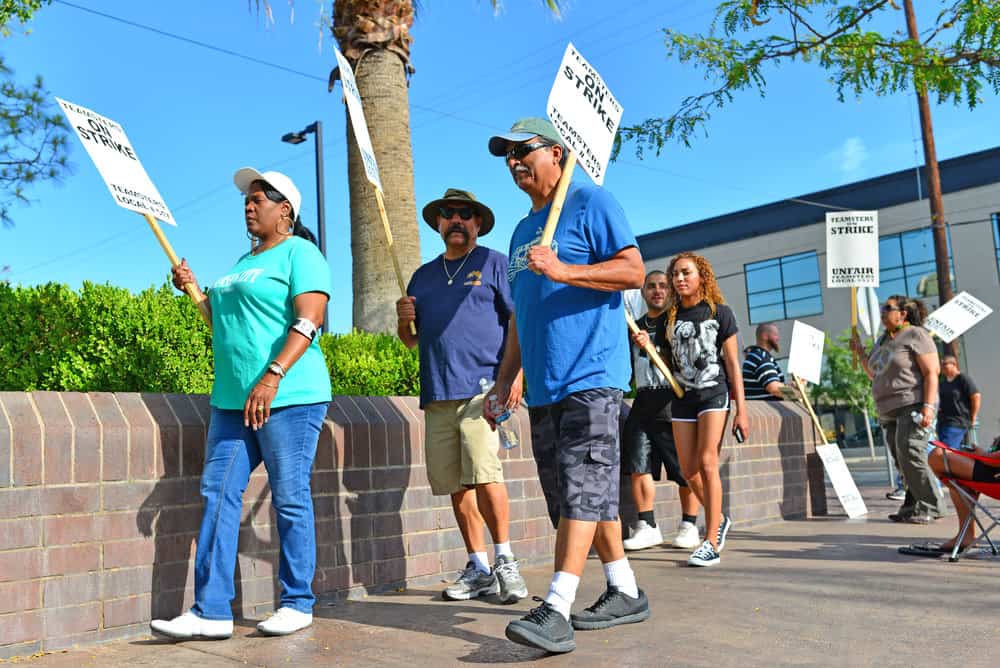
There are more than a few UPS Inc. (NYSE:UPS) shippers who feel like the ping-pong ball in the once-every-five-year-match between the company and the Teamsters union over the largest collective bargaining agreement in North America. Most endure the stress in silence.
Not Jeff Brady. In a LinkedIn post last week, Brady, director of logistics and transportation for e-tailer overstock.com and a 20-year transport and logistics veteran, gave voice to the frustration likely felt by many shippers that are being stuck in the middle as UPS Inc. and the Teamsters union haggle again over a new labor contract—this time at UPS Freight, the company’s less-than-truckload unit.
“Do we all get sick and tired of the never-ending issues that plague UPS?,” Brady asked rhetorically in his post, referring to shippers and carriers. “The constant threat and looming dark cloud of Teamsters and possible union issues grow extremely tiresome.”
Brady also had some choice words to describe the long-standing parcel duopoly controlled by UPS and rival FedEx Corp., (NYSE:FDX), describing it as the “2-headed, small parcel Brown and Purple machine” that inflicts quarterly and unannounced increases in various fees or reductions in service.” Brady’s comments about the duopoly reflect customer angst so long standing that it spawned the sobriquet “FedUps.”
Brady questioned the “end game” of the parcel giants as they spend billions of dollars re-engineering their networks to accommodate the expected secular surge in e-commerce shipments. “Are they only adding capacity for sortation at the facility level to accommodate the smallest parcels?,” he asked. “Who will move this other stuff?”
Brady’s comments came as UPS said last week it would not pick up any freight scheduled for delivery after Nov. 8 because it didn’t want to strand shipments in the event that UPS Freight’s unionized workers reject a second version of a five-year contract. The company said it plans to clear its system of freight by this Friday, and advised UPS Freight customers to seek alternate transport services. The move is expected to further tighten an already-firm LTL capacity landscape on the cusp of the peak holiday season.
A vote on the new contract version is set for Nov. 9-11. The union turned down the initial version in early October, citing substandard wage increases and little progress made in curbing the practice of driver subcontracting. The union said it has no choice but to call a strike sometime on Nov. 12 if the new version is rejected
That Brady’s post went live three weeks from the start of the peak holiday shipping season may not be surprising; one of his positions was a 44-month stint at food gift retailer Harry & David, whose business effectively lived and died by holiday season demand.
John G. Larkin, managing director at investment firm Stifel and also an industry lifer, said Brady’s comments are well-founded. “Teamsters care about Teamsters. UPS cares about (the) share price. Not much room there for the guys who pay the bills in that equation,” Larkin said in an e-mail on Friday.
UPS shippers have dealt with labor-related turbulence in the past. A 15-day Teamster strike in 1997 shut down UPS’ system, hung out to dry those shippers who had not or could not make contingency plans, and led many that had been exclusive UPS shippers to look elsewhere.
In 2013, decisions by three Teamster locals to reject supplements or riders to the master small-package contract delayed full ratification of the contract for months. Teamster leadership eventually took the unprecedented step of imposing the contract on all UPS Teamsters, including the three locals
Last month, Teamster leadership ratified a new 5-year small-package contract even though 54 percent who voted turned it down. The leadership invoked a “two-thirds” provision in the union’s constitution that requires a contract to be ratified if less than 50 percent of eligible voters cast ballots, unless two-thirds of those who voted rejected the compact. About 42 percent of eligible UPS voters cast ballots
The UPS and UPS Freight contracts cover 268,000 workers.











